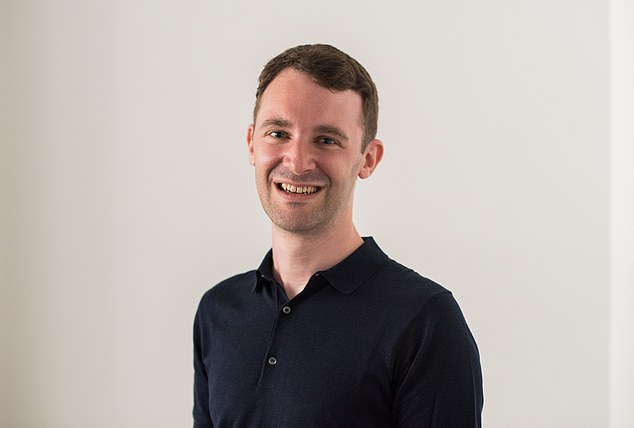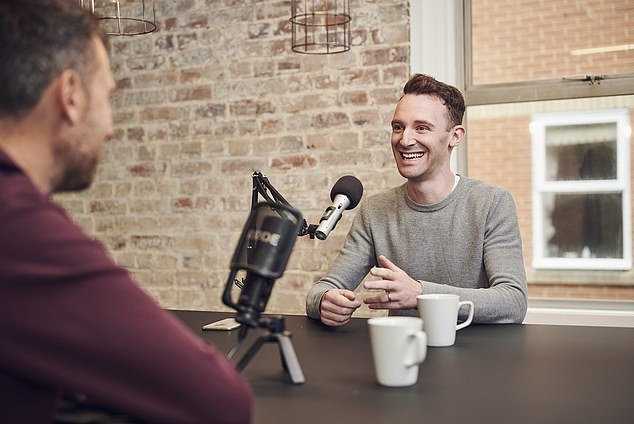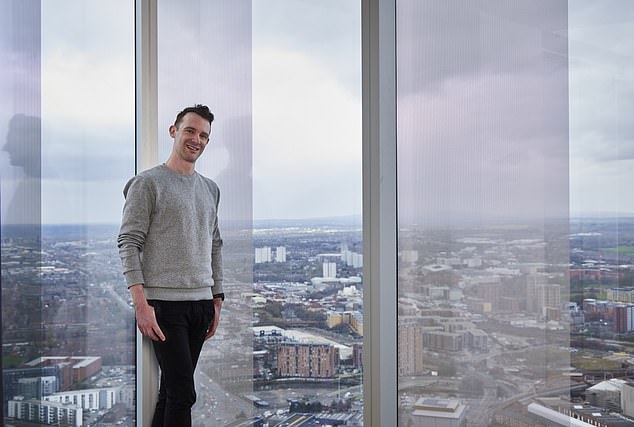Owning your own home is a British obsession, and many view ‘getting on the ladder’ as one of life’s great milestones.
Buying a property is not only viewed as a savvy investment, it is also considered by many to be a mark of independence, security and success.
The alternative is to pay seemingly ever-increasing rents to a landlord who could ask you to leave at any time, with just two months’ notice. For most tenants, renting isn’t a choice but a necessity.
But there are those who choose to rent, when they could afford to own.

The landlord that became a tenant: Rob Dix, co-founder of Property Hub and co-host of The Property Podcast is both an experienced buy-to-let landlord and renter
Of all the people in this camp, perhaps the last person one might expect would be a buy-to-let landlord and property investment expert.
Enter Rob Dix, co-founder of Property Hub and co-host of The Property Podcast. Rob is in his forties, and lives in London with his wife and children.
He is an experienced buy-to-let landlord, having bought his first rental property more than a decade ago.
He is also a successful author, publishing books including How to be a landlord, The Complete Guide to Property Investment and most recently, The Price of Money: How to prosper in a Financial World that’s rigged against you.
Although he was a homeowner in the past, he has been renting for the last 10 years. Plenty of people tell him he is mad. So why does he do it?
‘It all started when my wife and I went traveling many years ago,’ says Rob. ‘We loved the Airbnb lifestyle of chopping and changing whenever we liked.
‘So we decided to go into rental accommodation when we returned to the UK, rather than buy somewhere new. We have never looked back since.
‘Nobody seems to understand why I choose to rent,’ he says. ‘Everyone views renting as just throwing money away paying someone else’s mortgage.
‘Owning is taken as the default best thing to do if you can afford it. But I just don’t believe it’s as clear cut as that.’
Why Rob thinks renting trumps owning
Rob feels the flexibility of renting trumps the security of homeownership.
He argues renting gives him the ability to try new places without the cost, hassle and time constraints that come with moving as a homeowner.
Unlike so many that view their own home as a safe haven, Rob likens homeownership to feeling trapped.
I don’t like the feeling of not being able to move at short notice, whether that be for my kids’ schooling or just to try somewhere new
‘I just love the flexibility that comes with renting,’ says Rob. ‘I don’t want to be tied down by owning and I don’t want to worry about wanting to move, but feeling trapped by all the costs required when buying and selling.’
‘I don’t like the feeling of not being able to move at short notice, whether that be for my kids’ schooling or just to try somewhere new. I don’t want to be in a position where I can only rely on being able to sell my home. Who knows how long that will take.’
While Rob isn’t moving home as much as he used to, he still wants to know he always can do so as and when he pleases.
‘Knowing that you always have the option of moving quickly is more important to me than actually doing it,’ he says.
‘Obviously, now that we have a family, we don’t want to be moving every year. But when we were able to move to get my son into a different school, it wasn’t a big deal. Two months later it was done with minimal costs.’

Expert: Rob Dix (right) is co-host of the Property Podcast, which is popular with landlords
Rob also highlights the stress of moving home, something he feels he avoids by renting.
‘It often takes months to move home as a homeowner,’ he says. ‘For some people, it can even take years.’
Between sellers, buyers, estate agents, solicitors, and surveyors, the selling process has so many ways it can be delayed or fall apart.
This is exacerbated by chains of buyers and sellers all relying on each other to ensure they can complete on their own purchases.
A delay or a change of heart by just one person in the chain will have knock-on effects for everyone else.
‘I don’t want to spend my weekends doing DIY’
Rob is also wary of the other stresses that come with owning – such as having to pay up when something needs fixing.
He says: ‘Years ago when I did own a flat, there was always something to deal with, whether that was the gutter overflowing or a leak somewhere. Some people get a kick out of DIY. I’m not one of those people.
‘A great thing about renting is that maintenance isn’t my problem. If you can’t stand the idea of spending your weekends doing house chores, then a great thing about renting is that the repairs are someone else’s problem.
‘When I hear people talking about weekends spent fixing things it just sounds like no fun to me.
‘This is even more the case, when you hear about people who decide to fully renovate their home and live in a partial building site for six months.
‘However, I accept that when it comes to property repairs, the downside is you’re relying on someone else to come and fix it. For some people who prefer to be in control of the process or who like DIY, they may take issue with that.’
Can renting be cheaper than owning a home?
Perhaps the most surprising argument Rob uses in favour of renting is a financial one. He says that depending on the area where you live, renting can actually be cheaper in some cases.
‘Where house prices are high compared to average rents there is a good financial case for renting,’ he says. ‘That is particularly the case in expensive city locations like London, where on top of paying a high interest rate on your mortgage you may also have to cope with high service charges as well.
‘We have chosen to live in a fairly expensive flat in a fairly expensive area. I would never have chosen to buy the flat as an investment as the return on my investment would be shocking.
‘I’ve worked out that even if I was able to buy my current flat with a 10 per cent deposit, just the interest alone on an interest-only mortgage would work out as more than I am paying each month in rent. And that’s before service charge, capital repayments and repairs.’

Rob Dix is also co-founder of Property Hub, a website that provides free education for landlords as well as putting together multi-million pound property deals for its clients
But what about the home as an asset? House prices typically always rise in the long run, and many Britons would rather pay the costs on their own appreciating asset than pay rent on someone else’s.
Unsurprisingly, Rob has a quick answer to this question.
‘Historically, buying your own place and watching it go up and up in value and getting the capital gains tax free and all the rest, has been a winning formula,’ he says. ‘I completely understand why people default to it. And for many people it will be the best option.
‘I’m just saying; consider the alternatives. You don’t have to invest all your resources in your own home. You can invest elsewhere and rent the home you live in.
‘Yes, people need to have assets, you just don’t have to live in your assets.
‘I still benefit from house prices going up by investing in areas where I think house price growth prospects are better than where I live.’
Rob says there are also often considerable transaction costs involved when moving as a homeowner.
‘With renting, you just pay the deposit and don’t worry about anything else other than agreeing the move-in date, having given two months notice to your current landlord. This is so far from the case when selling and buying.
He adds: ‘If you plan to live in your home for fewer than five years, then it’s hard to make the argument for buying because you’ll have fewer years to spread all those transaction costs over.’
When a homeowner decides to move, they have to pay legal fees and estate agent fees. Then, to buy the next property, they are likely to incur stamp duty costs on top of a further round of legal fees.
The average high street estate agent fee is around 1.5 per cent of the final selling price. Although they can typically range between 1 and 3 per cent, not including the additional 20 per cent VAT they may be required to pay on top.
Currently, stamp duty kicks in for house movers on property purchases above £250,000. This is set to fall to £125,000 from April 2025.
For someone living in London like Rob, where house prices are high, these moving costs can mount up.

Stamp duty land tax: Currently, stamp duty kicks in for house movers on property purchases above £250,000. This is set to fall to £125,000 from April 2025
The average property price in inner London is around £600,000, according to the Land Registry.
Someone selling their home for £600,000 and paying the average estate agent commission of 1.5 per cent plus VAT (1.8 per cent.) will be losing £10,800 in agent fees.
Meanwhile, if they were to buy another £600,000 home they would also then be charged £17,500 in stamp duty.
That’s £28,300 of transaction costs in total – and that’s before factoring in legal fees, surveyors, removal firms and potential mortgage costs, particularly if you end up being hit by an early repayment charge.
Rob’s argument for renting may resonate with Londoners even more because house prices in recent years have performed so badly in the capital.
For example the price of the average inner London flat is exactly the same now as it was in 2016, according to Land Registry figures.
With the average Londoner enjoying no capital appreciation during this time, those that have bought and sold during the past seven years may view the cost of moving with even more disdain.

Struggling market: There has been very little house price growth in the capital for 7 years
What would Rob change about renting?
Rob accepts there are obvious downsides to renting – the big one being that renting can be a terrible and stressful experience in some cases.
‘The reality is that renters can be kicked out on a whim with two months notice because sometimes landlords need to sell or take control of the property for other reasons.
‘Two months’ notice doesn’t allow enough time for renters. If you have a family, that’s really too short a timeframe to find an alternative and I would like to see that made longer.
There is a lack of security, and the shoddiness of some of the landlords and rental properties needs addressing
‘That’s why in principle, I’m pro-rental reform because there is a lack of security, and the shoddiness of some of the landlords and rental properties needs addressing.
‘That said, the law still needs to protect landlords from the minority of bad tenants who cause trouble. It’s just about striking a balance which is obviously hard.
‘Ultimately, there are a small number of bad tenants and a small number of bad landlords. For the large majority of decent tenants and landlords in the middle, it should be a mutually beneficial thing.’
Rob adds: ‘I am definitely more sympathetic to renters, given the fact I can see it from both sides.
‘Perhaps this’ll mean nobody likes me because landlords think I’m pro-rental reform, while renters will just see me as another landlord.’
Rob also says there are strong financial advantages that come with owning, rather than renting.
This comes in the form of principal residence relief which means when homeowners come to sell their property the capital gains are tax-free.

Eviction: Rob says two months’ notice doesn’t allow enough time for renters. He says: ‘If you have a family, that’s really too short a timeframe to find an alternative.’
This is not the case for someone selling a buy-to-let or second home, where capital gains tax is charged at 28 per cent of the gain for higher rate taxpayers or 18 per cent of the gain for basic rate taxpayers.
‘Financially, owning your home is more tax efficient than investing elsewhere due to the capital gains tax relief when you sell,’ he says. ‘Plus, as a buy-to-let investor, I get taxed on the income my rental properties are producing before I can pay my own living costs.’
What’s his advice for young people saving up to buy?
The reality is that most people who don’t own, aspire to. They pour their life savings towards achieving home ownership, even if it means sacrificing holidays, hobbies and their social life in order to do so.
Rob says he isn’t telling people to necessarily stop working towards owning a home one day, he just questions whether they need to feel it is the only option forward.
‘I don’t think owning should be a default position from the beginning,’ he says.
‘You could make the argument that if you’re in your twenties, then having the flexibility to move for work or try new opportunities or to move in with a partner, or to have kids and get somewhere bigger as and when you need to is a useful thing. There is a time in life when renting may be more suitable.’

Don’t do things just because everyone else does: Rob doesn’t think owning should be a default position from the beginning, and that it will depend on someone’s situation
However, his one stipulation for anyone choosing to be a renter is to ensure they invest any spare money in something else, so that they are still growing a nest egg.
‘Invest in another property, or the stock market, or whatever it is – as long as you have some asset base that’s growing.
‘A lot of people just assume that renting is merely paying money down the drain – paying someone else’s mortgage etc.
‘But that’s not necessarily always the case. What would your deposit do for you if rather than investing in your home, it was invested elsewhere?
Will he ever go back to owning?
Ultimately, Rob believes it all comes down to what type of person someone is. Some people get itchy feet if they’re in the same place for too long.
Others prefer to stick with what they know. The very thought of moving unsettles them. The upheaval, the clutter, the memories. It’s not worth the risk.
He says: ‘The average time someone stays in their home is 19 years. That to me is crazy. But for some people, the idea of moving every two or three years might also seem crazy.’
‘There is nothing more important than being happy in your own home. It comes down to the flexibility of renting versus the security of owning. For me, the flexibility of renting is the clear winner.
‘Buying and owning takes up a lot of time and I decided that wasn’t for me.
‘I’m not telling people they are doing the wrong thing and they can’t tell me that I am doing the wrong thing.
‘I just don’t think owning your own home should be the default option for everyone.’
On the idea of ever one day going back to owning the home he lives in, Rob is fairly certain that renting is the life for him.
‘I think it is unlikely I’ll ever go back to owning. Even when interest rates hit rock bottom in 2021 and mortgage rates were ridiculously cheap, I didn’t take the leap.
‘But who knows… maybe something so egregious will happen while renting that I will think “sod this” and go back to being a homeowner.’
Some links in this article may be affiliate links. If you click on them we may earn a small commission. That helps us fund This Is Money, and keep it free to use. We do not write articles to promote products. We do not allow any commercial relationship to affect our editorial independence.





